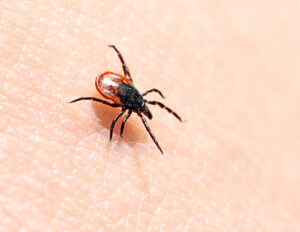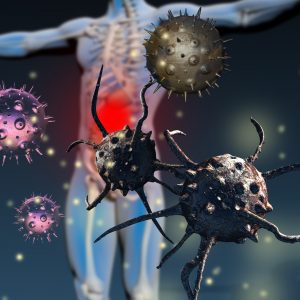
Leaky Gut, Chronic Disease, & Long Term Health
Leaky Gut This blog discusses the very important health issue of leaky gut. You will learn: What is the gut & the gut microbiome What
If you are a doctor or clinician looking to make a bigger impact on the world, have more job satisfaction and have up-to-date protocols and treatment solutions for your patients, check out our free functional medicine training led by functional medicine expert, Dr. Miles Nichols below.
Plus additional BONUS training videos on treating tough cases of brain fog and cognitive impairment!!
Alpha Gal Syndrome
Today’s article outlines a condition that is thought to affect, conservatively, 3% of the US population. However, there may be many undiagnosed cases and reported cases have been on the rise. Once diagnosed, treatment can often eliminate symptoms.
In this blog, we will look at Alpha Gal Syndrome and:
How Would You Know To Look Further Into A Potential Alpha-Gal Allergy?
Consider reading on if you are curious or if you or a loved one experience some of the following:
What Is Alpha Gal Syndrome (AGS)?
Alpha Gal Syndrome is a food allergy to red meat. Sufferers are allergic to all red meats: beef, pork, lamb, venison and rabbit. In more serious cases, the allergy might include dairy products and anything derived from mammals. Chicken, turkey, fish and seafood are usually not a problem. Alpha Gal can be severe and potentially life-threatening.
Alpha Gal is an allergy to a specific carbohydrate molecule called galactose-alpha-1,3-galactose or Alpha Gal. This carbohydrate is found in the cell membranes of most mammals, but not in humans and primates.
Facts About Alpha Gal Syndrome:
What Can Trigger The Alpha Gal Allergy?
Alpha Gal is found in the muscle and fat of red meats (beef, pork, lamb, venison, rabbit). Alpha Gal patients may also have an issue with meat broth/bouillon and other foods that unexpectedly contain mammalian fats (Román-Carrasco P, 2021). It may be used in certain sauces, pastries, mashed potatoes, vegetable dishes and desserts.
People who do not react to meat muscle may have symptoms from organ meats such as pork kidney (Román-Carrasco P, 2021). Some chicken sausages, made with chicken meat in pig tripe, can trigger symptoms (Román-Carrasco P, 2021). Even eating a small amount of only 1-2 grams of pork kidney can trigger allergy symptoms (Román-Carrasco P, 2021).
More sensitive people can be triggered by dairy products too. Approximately 90% of Alpha Gal sufferers do not react to milk products such as cheese (Román-Carrasco P, 2021). Less than 10% of AGS patients are advised to avoid dairy products and it is not part of the standard dietary recommendations for Alpha Gal allergy (Román-Carrasco P, 2021).
A small minority of extremely sensitive people will have to avoid Alpha Gal in any mammalian by-products. This includes surprising things like drug capsules and candy as they can contain gelatin. An example of this is one patient with Alpha Gal allergy who reacts to Haribo gummy bears because they contain gelatin (Román-Carrasco P, 2021). It is thought that <10% of people with Alpha Gal will have a problem with gelatin (Román-Carrasco P, 2021).
Other Sources of Alpha Gal
How Do You Get Alpha Gal Syndrome?
Alpha Gal allergy was first discovered in 2008. It comes from the bite of a lone star tick (Commins SP, 2009). This tick doesn’t transmit Lyme disease, but it can transmit Alpha Gal Syndrome. Lone star ticks feed on mammals like mice, rabbits, or deer, and acquire the Alpha Gal carbohydrate molecule from these animals. Later, if the ticks bite and feed on humans, they inject Alpha Gal through their saliva into the human host.
Humans don’t have the Alpha Gal carbohydrate molecule. The human immune system sees Alpha Gal from a tick bite as a foreign substance and mounts an immune response. The immune system develops IgE antibodies against Alpha Gal. The bite site becomes swollen and itchy as the immune system fights the Alpha Gal.
After the tick bite and the development of IgE antibodies to Alpha Gal, further exposure to Alpha Gal can trigger reactions. If red meat is eaten by people with AGS from the lone star tick, the immune system sees the Alpha Gal from the meat as a foreign substance. The body has an immune response which can be even worse than the initial response to the tick bite.
Not all lone star tick bites transmit Alpha Gal though. Currently only a few tick species cause the Alpha Gal allergy (Sharma SR, 2021).
Risk factors for developing Alpha Gal are tick bite exposure, participating in outdoor activities like hunting or hiking, living in rural areas, owning a pet who may get ticks and working in certain jobs such as forest service work.
IgE antibodies to Alpha Gal increase with the number of tick-bites a person gets and how recent those bites are (Vaz-Rodrigues R, 2022). It is thought that sensitization to Alpha Gal increases with repeated tick bites but this is not confirmed in all cases (Román-Carrasco P, 2021).
In recent years, there has been an increase in tick populations. Warmer winter temperatures mean more ticks survive the winter season. Mild weather means ticks can seek hosts for longer periods of time, increasing their chances of survival. The warmer climate means there are also more animals for the ticks to feed on, such as white-tailed deer. These factors combined have led to higher tick populations.
What are the Symptoms?
Symptoms of Alpha Gal Syndrome range from mild to severe. It can lead to:
Usually, a reaction from other food allergies, such as peanuts or shellfish, happens within minutes. With Alpha Gal, the reaction time is delayed. Meat doesn’t get absorbed into the bloodstream until about 3-6 hours after eating (Commins SP, 2009). This can cause the delayed allergic reaction and symptoms of anaphylaxis, swelling or hives that many people experience with Alpha Gal (Commins SP, 2009).
Heart Disease and Alpha Gal Syndrome
There is a link between heart disease and AGS (Wilson JM, 2018). Sensitization to Alpha Gal can be a risk factor for coronary heart disease, even in people who don’t show symptoms of AGS (Wilson JM, 2018) and (Sharma SR, 2021). Increased atheroma (build-up of fatty deposits) on the coronary arteries and plaques with more unstable features are both associated with high antibodies to Alpha Gal in AGS patients (Wilson JM, 2018).
Arthritis And Alpha Gal Syndrome
Arthritis and joint pain are thought to be a symptom of AGS (Platts-Mills T, 2020). Not much research has been done on arthritis and Alpha Gal, but many people with AGS report an improvement or disappearance of arthritis symptoms if they avoid red meat (Platts-Mills T, 2020).
Diagnosing Alpha Gal Syndrome
People may face skepticism or doubt from doctors and nurses. AGS is not widely known and doesn’t look like typical food allergies. Some doctors may not know about it, especially as it presents a few hours after eating meat.
Diagnosing Alpha Gal Syndrome can be a challenge. It can be confusing given the delayed reaction. Diagnosis is based on a blood test for IgE antibodies against the Alpha Gal carbohydrate molecule (Platts-Mills T, 2020). Other diagnostic tests that can be used are the skin prick test, the oral food challenge and the basophil activation test (Vaz-Rodrigues R, 2022). Next-generation diagnostic tools like the mast cell activation test, the histamine-release assay and others are being developed (Vaz-Rodrigues R, 2022).
Other useful factors for diagnosis are whether the person has a history of tick bites and delayed adverse reactions to eating meat. Diagnosis can be confirmed by completely avoiding red meat in the diet and seeing how the person reacts symptomatically (Platts-Mills T, 2020). Alpha Gal allergy to red meat can become worse over time if there is continued exposure to Alpha Gal.
Plus additional BONUS training videos on treating tough cases of brain fog and cognitive impairment!!
What Is The Mechanism Of Action Of AGS?
Most people throughout history have eaten meat without any problems. Think of hunter-gatherers. Humans typically eat meat and metabolize the Alpha Gal carbohydrate molecule without issue.
The mechanism of how a tick bite causes the immune system to develop antibodies is unclear (Sharma SR, 2021). How the tick itself acquires Alpha Gal and then causes a person to develop an immune response to Alpha Gal is also not known. There are some theories. The Alpha Gal antigens from the tick may be residual or recycled mammalian glycoproteins or glycolipids from previous blood feeding or they may come from the tick’s viruses, parasites, or bacteria (Sharma SR, 2021). Or Alpha Gal may possibly just originate in the tick itself (Sharma SR, 2021).
We do know that Alpha Gal comes from the saliva of the lone star tick (Sharma SR, 2021). The saliva contains the galactose-alpha-1,3-galactose or Alpha Gal molecule (Sharma SR, 2021).
How Does Tick Saliva Induce AGS?
The saliva of ticks is a mixture of substances that have immunomodulatory properties. When the tick bites, it injures the host’s skin. This prompts the mechanisms of wound healing in the host to begin.
These mechanisms include coagulation, vasoconstriction and platelet aggregation in the blood followed by responses of the innate and adaptive immune system. For the tick to feed off of the host’s blood, it has to stop or counteract the defense mechanisms of the host. So, substances in the tick saliva are able to suppress the host’s immune responses that would otherwise prevent efficient feeding and damage the tick (Román-Carrasco P, 2021).
Tick saliva can decrease proinflammatory mediators (like IL-12, IL-1β or TNF-α) and increase anti-inflammatory cytokines (like TGF-β or IL-10) (Román-Carrasco P, 2021). Prostaglandin E2, or PGE2, can do this. It induces vasodilation and impairs wound healing while reducing inflammation. Large amounts of PGE2 is present in tick saliva.
High levels of anti-inflammatory cytokines like TGF-β, IL-10 and IL-4 are found in mice infested by ticks (Román-Carrasco P, 2021). These amounts increase after every exposure to ticks. Repeated exposure to tick saliva can push the immune response toward a Th2 profile, inducing allergies and suppressing the pro-inflammatory Th1 response (Román-Carrasco P, 2021).
Human immune systems see Alpha Gal as a foreign body, so the immune system produces IgE antibodies to Alpha Gal (Commins SP, 2009). Anyone bitten by the lone star tick, who develops IgE antibodies to Alpha Gal, will have an allergic reaction when re-exposed to Alpha Gal. Re-exposure can come from mammalian meat, further lone star tick bites or from unexpected things with Alpha Gal like certain medications, candy, and even cosmetic products.
In most Alpha Gal cases, patients were able to eat red meat before first getting symptoms. A tick bite then triggers the production of IgE antibodies against Alpha Gal (Román-Carrasco P, 2021).
We know that the gut dysbiosis that is more common today is linked to the increase in food allergies. Dysbiosis or imbalanced gut bacteria can lead to food allergies. Or it may be an issue with mucosal barrier regulation that leads to an allergy. Current research shows that AGS is more prevalent in countries with higher numbers of allergy cases (Sharma SR, 2021).
AGS does not seem to be related to hygiene or a disposition toward allergies (Sharma SR, 2021). AGS has been reported in people with no history of a tendency towards allergies (Sharma SR, 2021). It happens to people living in both rural and urban locations around the world.
Allergic reactions caused by other types of insects are different. They usually cause an immediate skin reaction at the bite site.
Why Is The Reaction Time Delayed?
Most food allergens are usually proteins. But Alpha Gal is a carbohydrate. It can bind to either a protein or a lipid. It mainly seems to bind to lipid molecules rather than proteins (Román-Carrasco P, 2021). In fact, people with AGS seem to have more severe reactions after eating fattier meats vs muscle tissue. The fact that some may tolerate leaner cuts suggests that glycolipids carrying Alpha Gal might be involved in the onset of allergic reactions (Román-Carrasco P, 2021).
Digestion and absorption of lipids takes longer than digestion of proteins (Román-Carrasco P, 2021). By binding to glycolipids instead of glycoproteins, there is a delayed reaction time. It typically takes 3-6 hours after meat consumption for symptoms to present (Román-Carrasco P, 2021).
Blood levels of Alpha Gal-carrying glycolipids increase with alcohol consumption and exercise (Román-Carrasco P, 2021). This can explain why patients experience more severe allergic episodes when red meat is accompanied with alcohol or followed by exercise (Román-Carrasco P, 2021).
How Can AGS Be Avoided?
Currently, there is no cure or treatment for Alpha Gal Syndrome (AGI, 2020). So, it is best to prevent AGS in the first place. The best prevention is to avoid tick bites.
To avoid tick bites, wear light colored protective clothing. Clothing can be treated with natural insect repellents based on essential oils. Essential oils have been found in studies to be effective for repelling ticks. Many essential oils can give some degree of protection. Studies have found that the most effective are oregano oil, thyme, citronella, and clove bud oils (Štefanidesová K, 2017). One study found that clove bud, creeping thyme and red thyme essential oils were most efficient in repelling ticks and that a mixture of creeping thyme and citronella was even more effective than individual essential oils (Štefanidesová K, 2017).
Another option for reducing the risk of tick bites is permethrin spray (spray pants and shoes in a well-ventilated area when not wearing them and allow them to dry). Once sprayed, clothes will maintain tick repelling properties for up to a couple of wash cycles.
If bitten by a tick, remove it as soon as possible using specialized tick removal tweezers to minimize the amount of saliva the tick secretes.
Once bitten by a tick with Alpha Gal, you will most likely develop the IgE antibodies to Alpha Gal and suffer from AGS. There is limited research, but AGS may be reversible (Vaz-Rodrigues R, 2022). It seems that in some cases, people who can successfully avoid tick bites for 1-2 years after contracting AGS have a reasonable chance of recovering tolerance to meat products and reintroducing red meat into their diet (Vaz-Rodrigues R, 2022).
Is There A Treatment For AGS?
Currently there is no cure. The main treatment doctors recommend is to avoid Alpha Gal (Platts-Mills T, 2020). This means avoiding mammalian meat and dairy, in some cases. Very sensitive cases will have to be careful with other products containing mammal tissue, such as medications, candies, cosmetic products, etc., as mentioned earlier in this blog.
Patients who need to avoid red meat should check iron and vitamin B12 levels. Supplements can be taken if needed, to avoid an iron or B12 deficiency that may arise.
In addition to avoiding mammalian food products, it is best to avoid additional tick bites (Patel C, 2020). It is possible for symptoms of AGS to decrease or even disappear over time if there are no further tick bites from ticks with Alpha Gal (Vaz-Rodrigues R, 2022).
If an allergic reaction happens, it can be treated with an OTC antihistamine. Stronger reactions might need to be addressed with epinephrine. Doctors may recommend an epinephrine auto injector or epi pen to help with allergic reaction (AGI, 2020). Emergency treatment may be needed for a more severe anaphylactic reaction.
One medication that may be effective to improve and treat symptoms is Omalizumab, or Xolair by Genentech. It is an anti-IgE antibody drug approved by the FDA. It is currently used for moderate to severe asthma and chronic hives or rashes. In research, it is well-tolerated by patients with AGS (Michael, 2020). After 12 weeks of taking Omalizumab, people with AGS had less itching and hives (Michael, 2020). 86% of patients on Omalizumab had an improvement in symptoms after exposure to butter or other dairy products, while some patients had no symptoms after exposure (Michael, 2020). Several people in the study had no symptoms even after eating beef or pork while on Omalizumab (Michael, 2020). In early research, Omalizumab looks like an effective treatment for AGS (Michael, 2020).
Are There Any Alternative Treatments for AGS?
Acupuncture
The majority of AGS research says avoiding meat is the only treatment. But one study looked at a special type of acupuncture, called Soliman Auricular Allergy Treatment (SAAT), and how it can help with AGS (Bernal M, 2021). SAAT is a specialized acupuncture technique where one needle is placed in the ear. It is often successfully used to treat allergies. SAAT reprograms the immune system to stop over-reacting to allergens. Conventional and functional medicine agree that allergic responses develop due to an overreaction or dysfunction of the immune system. According to SAAT, if the body has the ability to develop the over-reactive immune response, it has the ability to reverse it as well.
SAAT can be done as a single procedure that often significantly reduces allergic responses and provides the longest relief from allergy symptoms compared to other common treatments (Bernal M, 2021).
One study found that SAAT acupuncture was effective for most patients with AGS. In the study, 60% had mainly gastrointestinal symptoms and 45% had dermatologic symptoms from eating meat and in some cases dairy (Bernal M, 2021). 96% of these participants said their symptoms were in remission after SAAT treatment (Bernal M, 2021). No adverse reactions occurred as a result of SAAT auricular acupuncture (Bernal M, 2021).
Other Alternative Treatments May Include:
Can AGS Sufferers Eat Genetically Modified Meat?
People with AGS can actually safely eat some genetically modified meat (Michelson, 2022). In a very recent development, pigs are being genetically modified for organ transplants. The human body will reject an organ from a pig, partly due to the Alpha Gal molecule, as the human immune system sees the pig organ as a foreign object. Scientists are working on genetically modifying the pig to create an organ that the human body will accept. This modification involves removing Alpha Gal. Also, the Food and Drug Administration approved genetically modifying pigs for human food and cosmetics in December 2020 (Michelson, 2022).
A biotech company called Revivicor is producing these pigs without Alpha Gal. They were involved in the first pig-to-human heart transplant. They are now sending Alpha Gal-free pork products, such as bacon, ham and chops, to AGS sufferers. This is effectively the test phase. If the experiment works, they will likely commercially produce Alpha Gal-free meat products from these genetically modified pigs.
Although there may be AGS-safe meat available, there are unknowns about whether there may be any problems associated with the genetic modification altering anything other than Alpha-Gal and thus there may be yet-to-be seen health consequences. While AGS-safe meat may possibly be a viable option, proceed with caution.
Summary
Alpha Gal Syndrome is relatively unknown, difficult to diagnose, and sometimes a serious allergy. Although treatments are limited, there are steps you can take to prevent, diagnose, and manage this disorder. Prevention is always best and avoiding tick bites is a vital way to prevent this and many other tick-borne diseases.
If it is determined that you have Alpha Gal Syndrome, testing and treatment options may include:
Testing Options:
Treatment Options:
As always, please reach out to us regarding any questions you may have about your health and healing. Our clinic has extensive expertise in diagnosing and treating a range of complicated, difficult-to-diagnose conditions. We can work on any issue(s) and partner with you to improve your health. Book a free health evaluation call with us today to see how we can help with your concerns. We can answer your questions and help you book an initial consultation with one of the functional medicine doctors in our clinic.
** Please stay tuned for our next Blog! **
If you are a clinician wanting to learn more about treatment of Lyme Disease and our clinician training programs, click here.
Does your current health situation look like this…
We specialize in finding answers and solutions for complicated chronic illness when people feel like they have tried everything. If this sounds like you, book a free call with us to see if we are the right fit for your health goals.








Leaky Gut This blog discusses the very important health issue of leaky gut. You will learn: What is the gut & the gut microbiome What

Research on Alzheimer’s disease is continuously looking for what causes the disease and how to better treat Alzheimer’s. A relatively new finding suggests that Alzheimer’s

In this blog, we will look at Lyme Disease and answer the question ‘How does Lyme Disease become chronic?’ You will learn: What Lyme Disease

In this blog, we will look at the causes of Bartonella. You will learn: What Bartonella is and how it compares to Lyme Disease What

In this blog, we will look at the many symptoms of Bartonella. You will learn: What Bartonella is and what causes it What are the

In this blog, we will look at Bartonella. You will learn: What Bartonella is and how it compares to Lyme Disease How Bartonella is spread

In this blog, we will look at Lyme Disease and answer the question ‘Is Lyme Disease curable?’ You will learn: What Lyme Disease is How

In this blog, we will look at Lyme Disease and the growing threat that it has become. You will learn: What Lyme Disease is How

In this blog, we will look at Lyme Disease and mental health. You will learn: How and why Lyme Disease can affect mental health How

In this blog, we will look at cognitive impairment & Alzheimer’s Disease in relation to various lifestyle factors. You will learn: How lifestyle can affect

Alpha Gal Syndrome Today’s article outlines a condition that is thought to affect, conservatively, 3% of the US population. However, there may be many undiagnosed

Can Lyme Disease Cause Joint Pain? In this blog, we will look at Lyme Disease and joint pain. You will learn: How & why Lyme
There was a problem reporting this post.
Please confirm you want to block this member.
You will no longer be able to:
Please allow a few minutes for this process to complete.

